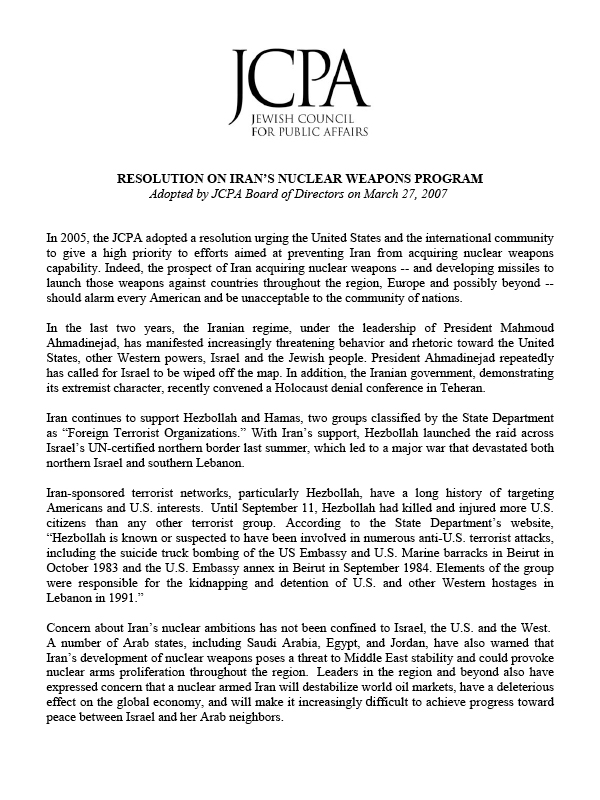Policy Resolution
April 18, 2007
In 2005, the JCPA adopted a resolution urging the United States and the international community to give a high priority to efforts aimed at preventing Iran from acquiring nuclear weapons capability. Indeed, the prospect of Iran acquiring nuclear weapons -- and developing missiles to launch those weapons against countries throughout the region, Europe and possibly beyond -- should alarm every American and be unacceptable to the community of nations.
In the last two years, the Iranian regime, under the leadership of President Mahmoud Ahmadinejad, has manifested increasingly threatening behavior and rhetoric toward the United States, other Western powers, Israel and the Jewish people. President Ahmadinejad repeatedly has called for Israel to be wiped off the map. In addition, the Iranian government, demonstrating its extremist character, recently convened a Holocaust denial conference in Teheran.
Iran continues to support Hezbollah and Hamas, two groups classified by the State Department as “Foreign Terrorist Organizations.” With Iran’s support, Hezbollah launched the raid across Israel’s UN-certified northern border last summer, which led to a major war that devastated both northern Israel and southern Lebanon.
Iran-sponsored terrorist networks, particularly Hezbollah, have a long history of targeting Americans and U.S. interests. Until September 11, Hezbollah had killed and injured more U.S. citizens than any other terrorist group. According to the State Department’s website, “Hezbollah is known or suspected to have been involved in numerous anti-U.S. terrorist attacks, including the suicide truck bombing of the US Embassy and U.S. Marine barracks in Beirut in October 1983 and the U.S. Embassy annex in Beirut in September 1984. Elements of the group were responsible for the kidnapping and detention of U.S. and other Western hostages in Lebanon in 1991.”
Concern about Iran’s nuclear ambitions has not been confined to Israel, the U.S. and the West. A number of Arab states, including Saudi Arabia, Egypt, and Jordan, have also warned that Iran’s development of nuclear weapons poses a threat to Middle East stability and could provoke nuclear arms proliferation throughout the region. Leaders in the region and beyond also have expressed concern that a nuclear armed Iran will destabilize world oil markets, have a deleterious effect on the global economy, and will make it increasingly difficult to achieve progress toward peace between Israel and her Arab neighbors.
Meanwhile, the Teheran regime has defied the International Atomic Energy Agency (IAEA) and the United Nations in their attempts to monitor Iran’s nuclear program, and, as a result, the UN Security Council to date has imposed on Iran escalating sanctions under Chapter VII of the UN Charter.
The JCPA believes that:
- The threat of Iran obtaining nuclear weapons is a matter of the gravest concern and utmost urgency to the world.
Therefore, the Jewish community relations field is urged immediately to:
- Independently and together with political, civic and religious partners in the general community, advocate that the United States, the leadership of the United Nations, particularly the permanent members of the UN Security Council, as well as other relevant governmental and non-governmental institutions, utilize all diplomatic and economic measures necessary to deter Iran from continuing its quest for nuclear weapons, while respecting the humanitarian needs of the Iranian people. Economic measures after appropriate consideration should include, for example, sanctions, targeted divestment (particularly direct divestment), and bank transfer restrictions aimed at the Teheran regime.
This resolution was passed as worded by the JCRC board on April 18, 2007
Document
